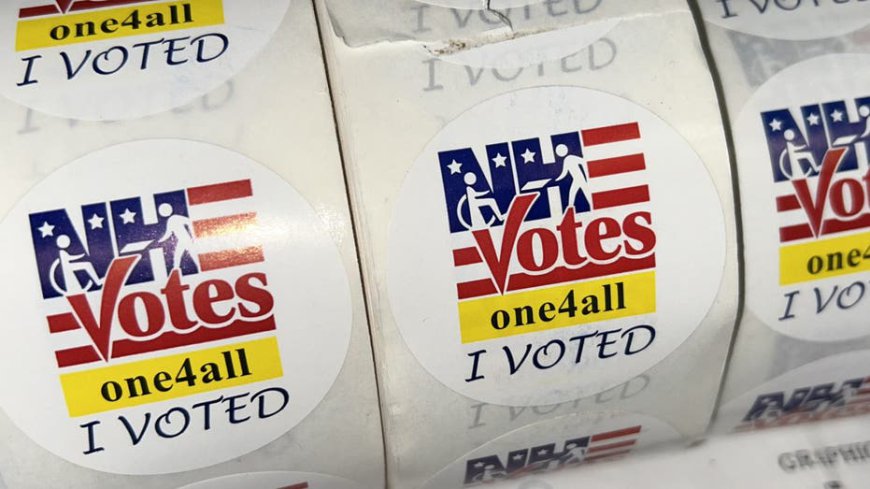NH bill would divide presidential electors by district: 'We want voters to feel their vote counts'
New Hampshire lawmakers are putting forth a bill that would reapportion the state's electors based on its two congressional districts' results -- similar to Maine and Nebraska.

New Hampshire lawmakers are looking to mirror Maine and Nebraska, and make theirs the third state that divides its presidential electors by congressional district in what a top Republican proponent called a bid to give more power to the voters.
Senate Bill 11, sponsored by Senate Judiciary Committee Chairman Bill Gannon and seven other Republicans, would award a presidential delegate to the winner of each of its two congressional districts and award two more to the winner of the statewide popular vote.
"Congressional district presidential electors shall cast their ballots for the presidential and vice-presidential candidates who received the highest number of votes in their respective congressional districts," Senate Bill 11 reads.
The bill will receive its first committee hearing Tuesday, Fox News Digital has learned.
POPULAR REPUBLICAN REVEALS WHAT'S NEXT AFTER GOVERNING NEW HAMPSHIRE FOR 8 YEARS
The Granite State is known for its "First-in-the-nation" primary contest and midnight canvassing on Election Day in the small community of Dixville Notch.
"We want to stay ‘First-in-the-nation’," Gannon, of Sandown, told Fox News Digital.
"That’s a big, important thing. We want our voters to feel: ‘I go out and vote – my vote counts.'"
Gannon dismissed criticism from state Senate Minority Leader Rebecca Perkins Kwoka, who told WMUR that Republicans should play "fair and square" and claimed state legislature maps are already "very gerrymandered."
"I think this is yet another example of the Republicans kind of trying to change the system to meet their needs," she told the outlet.
Gannon disagreed. "She had a statement; ‘they’re trying to steal a vote’ or something – Not the case at all," he said.
Gannon indicated that if the law were in effect in the contentious 2000 presidential race, the divided electors would’ve benefited Democrats – though Vice President Al Gore took the state under its current winner-take-all system. In 2016, the division would have awarded Donald Trump a lone elector when Hillary Clinton took the state.
"I hope to pick up some Democrat support unless they vote in lockstep. If they're willing to look at the bill and say ‘jeez, it could benefit either side.' It's just going to represent the people more," he said.
TRUMP'S ‘GULF OF AMERICA’ BID LEADS TO TEXAS-SIZED SUGGESTION: ‘GULF OF BUC-EE’S'
"That's what we're all about in New Hampshire, representing the will of the people."
New Hampshire notably has the largest state legislature in the country at 424 lawmakers. It dwarfs second-place Pennsylvania’s 203-member legislature.
Meanwhile, Democratic state Sen. Debra Altschiler panned the bill and quipped that if New Hampshire wants to follow Maine’s lead in this respect, there are other more progressive initiatives the legislature should take up.
"This bill is completely out of line with New Hampshire values," said Altschiller, of Stratham.
"And if we, as New Hampshire, wanted to follow Maine's lead, then we would have universal free lunch for all students, and we'd have background checks on firearms purchases. But we don't have that."
"So we don't always take our marching orders from other states."
CLICK HERE TO GET THE FOX NEWS APP
In the past three presidential cycles, neighboring Maine has awarded its divided electors 3-1 to the Democratic candidate. Each time, Trump won the one elector from the state’s rural, interior, 2nd congressional district.
The opposite has been true in Nebraska in 2020 and 2024, when President Biden and Vice President Kamala Harris each scored the single delegate from the Omaha-centric 2nd congressional district. Trump earned the other four delegates – and previous to 2016, all electors were often awarded to the Republican.
With the Republicans holding a 16-8 supermajority in the state Senate, the bill is likely to pass the chamber later this month or in February. The measure would then head to the state House of Representatives, where the GOP also holds a wide majority and where Republican lawmakers will likely be receptive to the legislation.

 newsroom
newsroom 







